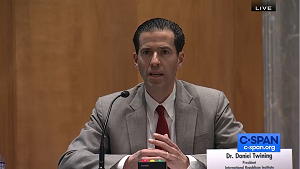ICYMI: IRI President Daniel Twining Testifies before the Senate Foreign Relations Committee
Washington DC – Today, International Republican Institute President Daniel Twining testified before the Senate Foreign Relations Committee on ‘Combatting Authoritarianism: U.S. Tools and Responses’.

Click here for full hearing and the written testimony as submitted to the committee.
In his testimony, Twining stressed that we must continue to invest in democracy assistance to help champions of government of the people, by the people, and for the people the world over to build institutions strong enough to stand against a rising tide of authoritarian subversion. Twining made the following recommendations to the committee:
Policy Recommendations:
The United States has many strengths in this competition. Aside from comprehensively bolstering our own competitiveness, there is much we can do to support democracies standing against PRC interference globally. Some specific ways we could do so:
- Support collective economic defense: NATO is currently proving its worth as a bulwark against Russian aggression. But there is no institution to provide collective economic security to countries being coerced by the PRC simply for standing up for democratic values. Bills such as the Countering China Economic Coercion Act are a good start, but the US and our partners need to do more. We should immediately begin undertaking serious efforts to construct a credible deterrent to PRC economic aggression.
- Provide technical support to countries negotiating BRI deals: Some countries have signed bad deals with China because they lacked technical expertise to negotiate good ones. The US and our allies can fill this gap, and we should find ways to do so — if only because infrastructure shortfalls around the world provide leaders with compelling rationales to continue to turn to the PRC for lending. If they do so, their publics and political opposition should know that technical support is available to make sure the deals are good ones, so that they can demand to know why leaders failed to take advantage of such a facility.
- Support independent journalism globally: Chinese propaganda outlets like CGTN have seen success in places like Africa because they have the money to offer higher salaries to credible journalists and recognized early on the importance of cultivating local talent to advance pro-PRC narratives, effectively removing independent voices from the conversation on China. The CCP has gone as far as outright attempts to buy public broadcasters in many African countries, in addition to its efforts to coopt local media and spread pro-PRC disinformation and propaganda. The US and our allies have prioritized support for independent journalism for many years, but our efforts do not currently match the scale of the challenge. The US must invest additional resources in democracy, rights, and governance programming to support independent media to investigate and expose authoritarian aggression; counter state-sponsored propaganda and disinformation; bolster the integrity of the information space; and build media literacy to mitigate the impact of disinformation on popular perceptions of actors like the PRC and the Kremlin.
- Support democracy and responsive governance: Supporting democracy around the world creates a comparative foreign policy advantage for the United States. US support for democratic principles through institutions like IRI, the National Democratic Institute, and the National Endowment for Democracy has had measurable impact on democratic development and resilience around the world. In an era of ideologically driven great-power competition, supporting the aspiration to freedom abroad is not only the right thing to – it produces tangible national security benefits for the United States, including preventing friendly countries from succumbing to state capture by foreign authoritarian adversaries. Polling by the Bush Institute, the Penn-Biden Center, and the Reagan Institute shows that Americans support such values-based leadership and believe the United States should stand with democracies against authoritarian assault. Building on the Democracy Summit and working with the Department of States and United States Agency for International Development, the U.S. can and must allocate the resources to steel the foundations of global democracy against authoritarian powers’ insidious attacks.”
